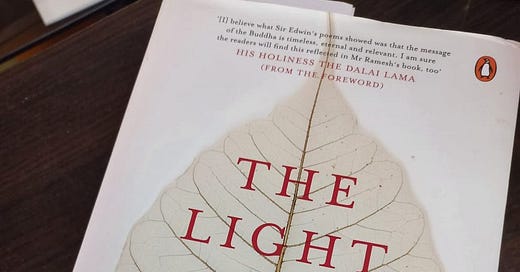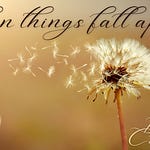"After me repeat Your numeration till we reach the Lakh, One, two, three, four, to ten, and then by tens To hundreds, thousands." After him the child Named digits, decads, centuries; nor paused, The round Lakh reached, but softly murmured on "Then comes the koti, nahut, ninnahut, Khamba, viskhamba, abab, attata, To kumuds, gundhikas, and utpalas, By pundarikas unto padumas, Which last is how you count the utmost grains Of Hastagiri ground to finest dust; But beyond that a numeration is, The Katha, used to count the stars of night; The Koti-Katha, for the ocean drops; Ingga, the calculus of circulars; Sarvanikchepa, by the which you deal With all the sands of Gunga, till we come To Antah-Kalpas, where the unit is The sands of ten crore Gungas. If one seeks More comprehensive scale, th' arithmic mounts By the Asankya, which is the tale Of all the drops that in ten thousand years Would fall on all the worlds by daily rain; Thence unto Maha Kalpas, by the which The Gods compute their future and their past."
~ Book the First, The Light of Asia, by Edwin Arnold
Welcome back to SkyGazing. Sorry, I have been tardy! Well, I have been away reading some fairly large books that I hope to share with you soon enough.
For starters, here’s a review of The Light of Asia; the poem that defined the Buddha by Jairam Ramesh, which is a commentary on the work of the poet, Edwin Arnold, the context in which he wrote the original poem, the deep influence it came to have upon a great many thinkers, writers and leaders of our time, from Swami Vivekananda to Jawaharlal Nehru and Mahatma Gandhi, Oppenheimer and Kitchener, Raymond Chandler, C.V. Raman, among others. The poem is written in blank verse and is divided into eight books. This commentary on it has four sections, Arnold’s pre Poona days, the influence and context of the poem, its aftermath, and Arnold’s legacy. In as such, the poem is a life apart from yet intertwined with Arnold’s.
For those of you who haven't already read The Light of Asia, I would recommend you go there before you come to this work. Also do go to the Lalitavistara Sutra, which is the original epic poem that outlines the life of the Buddha in full. I would also recommend you read Sri Aurobindo’s Savitri after, to capture the similarity of the cadences.
Arnold’s work is a biographical study of the Lord Buddha, but to my mind it is very westernised, casting him as the "Saviour” and divine, born again, with a very Christianised lens on divinity. So as much as Arnold believed he was travalleing away from or positing a counter to the monotheistic linearity of the church in his time, from the Indic lens, he very much remains embedded within that framework. For instance his line “And mercy cometh to the merciful” is very much a refrain of Matthew 5:7 “Blessed are the Merciful, for they will receive Mercy”. Arnold, in my opinion, was not as far removed or opposed to the constraints of his native lens as he seems to believe. So, it's important to read the poem in its original before you arrive here.
Also, my one pet peeve with Ramesh's work is his use of the term ‘Mutiny’ for the Indian War of Independence or the Rebellion of 1857. I find it too irksome and jars my reading of the book, building a sort of crescendo of annoyance. While he offers a note in the book, however I find that there was no need to use ‘Mutiny’ when not directly citing Arnold. I also find that when you read a book aloud, there are some evident grammatical omissions, bit of poor editing here, a missing 'to' and 'the' that kind of thing, nothing too big, but articles that become apparent by their absence. Still, a beautifully researched edition, and well worth the read.
Do remember this is just to give you an introduction to the book so I will be reading selected excerpts that I found interesting to whet your appetite, an asynchronous book club if you will. Please do engage with the book on your own. Of course I appreciate shares, comments and social media posts. Try not to tag the author if your comment is not favourable. That's just a bit rude.
The first section is a biography of Arnold and his context. It was a time of the great discovery of India in Britain, and Ramesh describes at length the socio-political climate in which Arnold arrived at his insights into the life of the Buddha. Born in Gravesend, on 24 June, 1832, to landed gentry, and his work prior, anthologies such as Poems: Narrative and Lyrical, The Light of the World, and Gandhi's favourite The Song Celestial. Ramesh also locates him in Poona, where Arnold would head the Deccan College, at a vibrant time when Jyotiba Phule was organising education for all and VS Chiplunkar was mentoring Bal Gangadhar Tilak. A time when the Christian missionary movement was strong, causing Arnold himself to question the wisdom of conversions. Many brahmins too converted, he notes, at a time when back home in England, the suitability of the influence of the Good Book was in question. The Christianity of the poem is in tone, but the content of the poem is so rich with knowledge both Vedic and Buddhist, his understanding of caste, king, hierarchy, what the Buddha was upturning, and what society of the time reflected, that there was no disputing the heft of the poet. Indeed, neither may we that of the biographer who captures every painstaking nuance across continents in a deeply complex time. In such social upheaval and churn, the book reflects the way in which England and India were realigning how we thought about religion, spirituality, society. It was a time of Florence Nightinglae’s India mission, the war effort, and the need for women to both cater to and be catered to in terms of social equality. And in that time of churn, the sort of non dogmatic, non ritualistic counter to what was being set aside both in England and in India, was the wisdom of the Buddha. Much of this is beautifully contextualised in the book.
To my mind, the most vital lessons, and the most relevant ones for us, in it come from the subtle but interesting comparison between the reclaiming of Ayodhya for Lord Ram and Edwin’s role in reclaiming Bodh Gaya for the Buddhists. That previous movement and hand over ended in 1953 peacefully, with the graciousness of the mahants, with joy on both sides, with the intermediations of men such as Jawaharlal Nehru and C. Rajagopalchari.
There is much more in the book that I have not mentioned, the depth of influence on Rabindranath Tagore, Sri Aurobindo, the King of Siam, on film and cinema, and Arnold’s own further life, in Sri Lanka and Japan, regional Indian translations. The book is rich with reference, and personalities that intersected in and out of the meridian that The Light of Asia was.
I do wish there was more about the actual poem itself actually. I would have loved to see notes that Arnold may have left about the poem, but apart from a few explanations on why he wrote it these are far and few between. It is more the perspective of this commentary that the poem rose as a product of its influences and their catalyst in its time. I also wish there was more critical referencing of Arnold and his role in the British ‘civilising’ mission.
The transmission of Buddhist texts and the biography of the Buddha has been unabated since the 2nd century CE, so what was it about this poem that caught the imagination where others didn’t? Was it metre, language, Arnold’s eminence and therefore his interactions with his contemproraries? I wish this book had more contemplation of the author (Ramesh’s) insight into the wherefore of its greatness rather than a mere clinical exposition of why everyone else thought it worked and how acclaimed it was. What does he, who has been in government himself, think of the Anglicised lens of an Indian Buddha? He does give us a brief glimpse of what he’s been thinking at the end, but overall, a lot of information, but he doesn’t join too many dots for us. Which could be good or bad, depending on how you see it.
One of the better non-fiction tomes on a key philosophical work, fundamentally a biography of its author. The narrative continues on to biographical nuggets like tracing the interesting circumstances surrounding the death of Channing Arnold, one of Edwin’s sons, on a farm in UP.
Towards the end, Ramesh points out that Shelley’s lines from Prometheus Unbound may well have influenced the title of the poem:
Asia! Thou Light of Life!
Shadow of Beauty unbeheld!
Hmmm. It always surprises me when the coloniser adores their subjects. How good we must have been. Have a good read/listen!
Best,
Gayatri













Share this post